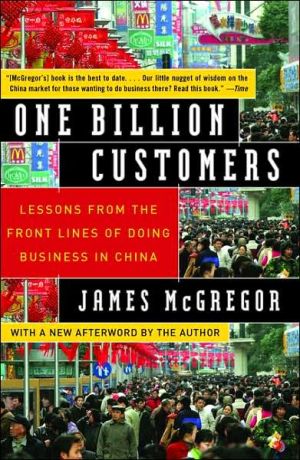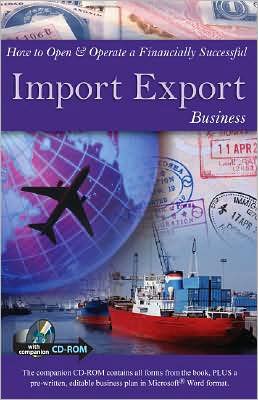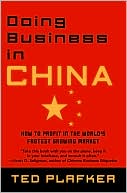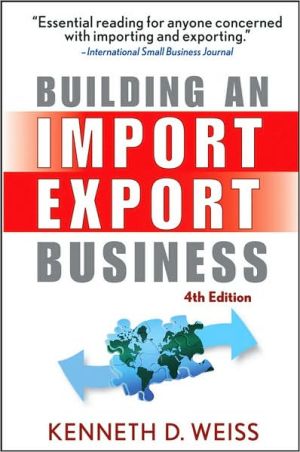One Billion Customers: Lessons from the Front Lines of Doing Business in China
Companies from around the globe are flocking to China to buy, sell, manufacture, and create new products, but as former Wall Street Journal China bureau chief turned successful corporate executive James McGregor explains, business in China is never quite what it seems. One Billion Customers offers compelling narratives of personalities, business deals, and lessons learned, creating a coherent pictures of China's emergence as a global economic power with a dog-eat-dog business climate that has...
Search in google:
Companies from around the globe are flocking to China to buy, sell, manufacture, and create new products, but as former Wall Street Journal China bureau chief turned successful corporate executive James McGregor explains, business in China is never quite what it seems. One Billion Customers offers compelling narratives of personalities, business deals, and lessons learned, creating a coherent pictures of China's emergence as a global economic power with a dog-eat-dog business climate that has turned bureaucrats into billionaires and left many foreign business executives with their pockets turned inside out. Soundview Executive Book Summaries Lessons From The Front Lines Of Doing Business In ChinaWith a population of 1.3 billion people, China offers companies from around the globe a massive market for their products and services. According to former Wall Street Journal China bureau chief and corporate executive James McGregor, nothing about doing business in China is easy. In One Billion Customers, McGregor presents the stories, personalities, business deals, and lessons learned that can help businesses gain insight into how China really works. McGregor explains that the consumer market in China has the potential to be larger than North America and Western Europe combined. In recent years, he writes, this sprawling country "has surpassed Britain as the world's fourth-largest economy." China has not only become the world's largest market for electronic appliances, but it now consumes 25 percent of global steel and 30 percent of cement. Negotiations and Agreements Why is working with China so difficult? McGregor explains that its laws are often only the law when they benefit China. He writes, "Negotiations can take forever and the resulting agreements can be promptly ignored." With an underlying reputation for corruption and secrecy, he adds, Chinese partners, customers and suppliers have a reputation for stealing technology and trade secrets from foreign companies. Why do outsiders fail in China? McGregor writes that foreign executives often get "run over by their Chinese competitors, the Chinese government, or their Chinese partners — or sink themselves through various combinations of unrealistic expectations, impatience, and lack of common sense." To show outsiders what it is like to do business in China, McGregor offers the details of how specific business deals either worked or failed, and describes the actions of those involved on both sides of these deals, and how politics and prejudices affected expectations and outcomes. Through these stories, he describes the aspects that have both frustrated and rewarded outside businesspeople. One Billion Customers is unique in its approach to delivering its business lessons. At the beginning of each chapter, McGregor introduces the players and the situation he is about to describe, and provides an overview of the context in which they find themselves. Next, he tells the story that unfolds as a narrative. Each ends with a summarization of what the preceding events mean to the reader, and how their lessons can be used to improve business conducted in China. Honed while working as a journalist and businessman during 17 years in that country, McGregor's easy-to-read style and first-person perspective make his observations highly digestible, timely and pertinent to readers. Startup and Turnaround McGregor begins One Billion Customers by pointing out that China is "simultaneously the world's largest startup and the world's largest turnaround." After 2,000 years of continuous imperial rule, and a "crippling encounter with communism that left an impatient, hungry and hardworking population determined to get rich and regain its rightful place in the world," McGregor writes that China presents opportunities and challenges to global businesses on a range and scale that have never been seen before. To help businesspeople capitalize on the stories he tells, McGregor concludes each chapter with a collection of tips called "The Little Red Book of Business." In these sections, he boils down the fruit of his knowledge into several bulleted points that describe exactly what can be done to succeed in China. Why We Like This Book One Billion Customers is filled with a fascinating collection of valuable stories gleaned from numerous interviews with those on the front lines of China's rise to power. By offering a deep look into the minds of the Chinese people and their business practices, McGregor helps outsiders grasp the fine details that can either make or break deals with their Chinese counterparts. Full of great writing and international intrigue, One Billion Customers delivers a wealth of information and advice. Copyright © 2006 Soundview Executive Book Summaries
Preface\ It should have been a routine flight from Beijing to the coastal city of Fuzhou. The government-owned airline was new and the airplane was fresh from a foreign factory. But I began to get a sense that this ride wouldn't be entirely routine when I saw how cheerfully untrained our crew was. The flight attendants sat giggling in the front row, eagerly putting together take-home bags of the best food from the extra meals. The cockpit door was open throughout the flight. The flight engineer came back to snooze in the front row.\ Finally we began our descent. The lush green countryside, populated by farm huts and pigpens, loomed closer and closer. As the aircraft swung around to line up on the rapidly approaching runway, two of the flight attendants stood behind the pilot and copilot as if surfing the plane onto the runway. Then, with barely fifty feet between us and the rubber-scarred runway, the pilot suddenly jammed the throttles forward. Engines screaming, we began an abrupt climb. Amazingly, neither of the flight attendants toppled over, but they did stumble back to their seats with a look of fright. Up and around we went, once again lining up on the runway. Then I heard the distinctive eerrrrrrrr of the landing gear being lowered and felt the shuddering as the wheels entered the airstream. I hadn't noticed any of that on our first approach. So that's why we did the sudden go-around!\ I was thinking about how sensible it was to travel by train as I walked into the terminal. Then I saw a propaganda poster on the wall that has since remained firmly in my mind as the perfect description of the transformation China is undergoing: STRIVE TO FLY NORMAL. That is the essence of what China is trying to do: become a normal country, one that is integrated into the world economy, a place where citizens can concentrate on their prosperity and happiness instead of suffering from political power struggles. Like our novice flight crew, China has spent that past twenty-five years alternately stumbling and soaring through a massive trial-and-error reform process, and so far most of the landings have been smooth.\ It is difficult for anyone in the West to overestimate China's growing role in the global economy. With 1.3 billion mouths to feed, its consumer market has the potential to be larger than North America and Western Europe combined. Measured by purchasing power parity, China's current per-capita GDP is $5,000 and rising steadily each year. It has surpassed Britain as the world's fourth-largest economy. China consumes 25 percent of global steel, 30 percent of cement, and is the world's largest market for electrical appliances. Foreign companies are flocking here, both to sell and to buy. Contracted foreign investment in China now averages $420 million a day.\ Since 1978, when Premier Deng Xiaoping launched a set of economic reforms that included using foreign companies and their capital, technology, and management skills, China has become a manufacturing powerhouse, combining technologically sophisticated factories with energetic, intelligent, and low-cost labor. But China has allowed foreigners in only on its own terms, and those terms are often opaque, contradictory, and bewildering. All too often, laws are only the law when they benefit China. Negotiations can take forever and the resulting agreements can be promptly ignored. Corruption is frequently the lubricant that greases the wheels of commerce. Business in China has always been conducted behind multiple curtains and amid much subterfuge, and that hasn't changed. Foreign companies rightly fear that Chinese partners, customers, or suppliers will steal their technology or trade secrets or simply pick their pockets. Testy relations between China's Communist leaders and the United States and other democracies requires that politics be an integral part of business plans. China's entry into the World Trade Organization in 2001 and the country's desire to transform local companies into global leaders is bringing more international practices into China by the day. But I still see foreign executives confidently breeze into China only to be run over by their Chinese competitors, the Chinese government, or their Chinese partners — or sink themselves through various combinations of unrealistic expectations, impatience, and lack of common sense. The more business in China changes, the more it stays the same. As a journalist, I have traveled the entire country and enjoyed a front-row seat for this historic drama. As a businessman, I've been involved in the power plays, the complex negotiations, and the political intrigues that are a routine part of doing business in the country.\ This book is intended to show rather than tell what it is like to do business in China. There are no simple formulas or magic solutions. Only by showing the sometimes complex details of how certain deals came together or fell apart, how the people involved viewed and treated each other, how politics and prejudices tainted expectations and outcomes, will I be able to convey to you the nuances that have made China such a frustrating yet rewarding place for so many foreign businesses. Each chapter begins with a simple introduction of the characters and situation. Next, in an overview section, I put the characters and situation in their proper context. The story then unfolds as a straightforward narrative. At the end, in a section entitled "What This Means for You," I explain how what happened in this chapter can affect how you do business in China. Finally, I summarize — pithily, I hope — many of my own observations in a takeoff on Mao's Little Red Book.\ Demographers may quibble with the title: China's current population is 1.3 billion. But it is the round "billion" that matters, that threshold number that symbolizes the vast and untapped continental-size market, the teeming Chinese masses waiting to be turned into customers, the dream of staggering profits for those who get here first, the hype and hope that has mesmerized foreign merchants and traders for centuries. The title is my tribute to another American journalist-turned-businessman, Carl Crow, who lived in Shanghai for twenty-six years and in 1937 wrote 400 Million Customers, a rich trove of anecdotes and insights about the Chinese people and doing business in China, much of which still holds true today. I share Crow's deep respect and admiration for, as he put it, "the interesting, exasperating, puzzling, and, almost always, lovable Chinese people." My goal for this book is to also share Crow's ability to convey timeless insights and commonsense lessons about Chinese business practices, and the deeply ingrained thinking and behavior patterns of Chinese people, through a combination of scholarship, grassroots experience, lively narrative, and good humor that transports the reader deep into the China business world.\ Please enjoy the journey.\ James McGregor\ Beijing, 2005\ Copyright © 2005 by James McGregor
Map viii Cast of Characters x Preface xviii Introduction - A Startup and a Turnaround - With one foot firmly in the past, and the other stepping into the future, China is simultaneously the world's largest startup and turnaround. - 1 1 - The Grand Bargain - Two hundred years of foreign domination and duplicity have left a residue of suspicion and distrust. Understanding that history is essential to doing business with the Chinese. - 21 2 - Same Bed, Different Dreams - Avoid joint ventures with Chinese government partners. The clash of civilizations in Morgan Stanley's joint-venture investment bank shows why and offers hard-learned lessons on how to cope. - 58 3 - Eating the Emperor's Grain - China's relationship-driven system is often incompatible with honesty. This peasant tycoon's journey into the dark heart of China's endemic corruption shows how it works and outlines your options. - 94 4 - Dancing with the Dinosaurs - Powerful bureaucratic opponents can be beat if you have China's interests at heart. Dow Jones and Reuters demonstrate how using China's own tactics can be useful. - 126 5 - Caught in the Crossfire - Government lobbying must be a key part of your China business plan, especially for technology companies that might be squeezed between hot competition and the Cold War. - 155 6 - The Truth Is Not Absolute - The Communist Party believes it must control information to stay in power, but China needs an informed citizenry to compete in a global economy. This leaves the media, from Rupert Murdoch to a crusading Chinese journalist, searching for the size of their cages. - 190 7 - The Best-Laid Plans - Government planning and manipulation of foreign companies fueled China's construction of the world's largest telecom system. But this saga shows how entrepreneurship and the market can beat the planners. - 225 8 - Managing the Future - China is a nation always cramming for final exams, but it will take innovation, not prescribed solutions, to pass the global business test. - 258 Afterword - 295 Acknowledgments - 303 Index - 311
\ Soundview Executive Book SummariesLessons From The Front Lines Of Doing Business In China\ With a population of 1.3 billion people, China offers companies from around the globe a massive market for their products and services. According to former Wall Street Journal China bureau chief and corporate executive James McGregor, nothing about doing business in China is easy. In One Billion Customers, McGregor presents the stories, personalities, business deals, and lessons learned that can help businesses gain insight into how China really works. \ McGregor explains that the consumer market in China has the potential to be larger than North America and Western Europe combined. In recent years, he writes, this sprawling country "has surpassed Britain as the world's fourth-largest economy." China has not only become the world's largest market for electronic appliances, but it now consumes 25 percent of global steel and 30 percent of cement.\ Negotiations and Agreements\ Why is working with China so difficult? McGregor explains that its laws are often only the law when they benefit China. He writes, "Negotiations can take forever and the resulting agreements can be promptly ignored." With an underlying reputation for corruption and secrecy, he adds, Chinese partners, customers and suppliers have a reputation for stealing technology and trade secrets from foreign companies. Why do outsiders fail in China? McGregor writes that foreign executives often get "run over by their Chinese competitors, the Chinese government, or their Chinese partners — or sink themselves through various combinations of unrealistic expectations, impatience, and lack of common sense."\ To show outsiders what it is like to do business in China, McGregor offers the details of how specific business deals either worked or failed, and describes the actions of those involved on both sides of these deals, and how politics and prejudices affected expectations and outcomes. Through these stories, he describes the aspects that have both frustrated and rewarded outside businesspeople.\ One Billion Customers is unique in its approach to delivering its business lessons. At the beginning of each chapter, McGregor introduces the players and the situation he is about to describe, and provides an overview of the context in which they find themselves. Next, he tells the story that unfolds as a narrative. Each ends with a summarization of what the preceding events mean to the reader, and how their lessons can be used to improve business conducted in China. Honed while working as a journalist and businessman during 17 years in that country, McGregor's easy-to-read style and first-person perspective make his observations highly digestible, timely and pertinent to readers.\ Startup and Turnaround\ McGregor begins One Billion Customers by pointing out that China is "simultaneously the world's largest startup and the world's largest turnaround." After 2,000 years of continuous imperial rule, and a "crippling encounter with communism that left an impatient, hungry and hardworking population determined to get rich and regain its rightful place in the world," McGregor writes that China presents opportunities and challenges to global businesses on a range and scale that have never been seen before.\ To help businesspeople capitalize on the stories he tells, McGregor concludes each chapter with a collection of tips called "The Little Red Book of Business." In these sections, he boils down the fruit of his knowledge into several bulleted points that describe exactly what can be done to succeed in China.\ Why We Like This Book\ One Billion Customers is filled with a fascinating collection of valuable stories gleaned from numerous interviews with those on the front lines of China's rise to power. By offering a deep look into the minds of the Chinese people and their business practices, McGregor helps outsiders grasp the fine details that can either make or break deals with their Chinese counterparts. Full of great writing and international intrigue, One Billion Customers delivers a wealth of information and advice. Copyright © 2006 Soundview Executive Book Summaries\ \ \ \ \ \ Publishers WeeklyThe promise and perils-mostly the latter-that Western businesses face in China's huge but chaotic market are probed in this illuminating if not quite reassuring primer. Ex-Wall Street Journal China bureau chief McGregor presents a series of case studies from capitalism's Wild East, including a rocky joint venture between Morgan Stanley and a Chinese bank; the rise and fall of a Chinese peasant turned billionaire smuggler; Rupert Murdoch's travails in bringing a satellite TV network to China; and a muck-raking Chinese financial journalist's battles with both government censorship and the private media's cozy relationships with advertisers. He caps each chapter with gleanings of wisdom ("assume your procurement department is corrupt until proven innocent") and pointers on such topics as which bribes are ethically acceptable (expenses-paid junkets to America "with generous opportunities for tourism and relaxation") and which are not (suitcases full of cash). McGregor writes with the confidence of an old China hand, occasionally lapsing into generalities about Asian "shame-based" cultures, but generally treating the Chinese businesspeople he profiles with the same sympathy and insight he accords Westerners. Still, the picture he paints of the Chinese economy is a daunting one, ruled by over-mighty Communist officials, bribe-hungry bureaucrats, Byzantine regulations and a murky, cut-throat business culture structured by personal and family ties. Westerners contemplating a plunge into this shark tank will profit from McGregor's cautionary tales.\ Copyright © Reed Business Information, a division of Reed Elsevier Inc. All rights reserved.\ \







